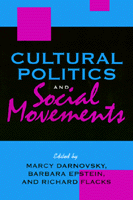![]()
![]() Bridging the worlds of activism and academia—this volume combines social movement theory with the real experiences of activists
Bridging the worlds of activism and academia—this volume combines social movement theory with the real experiences of activists![]()
![]()
![]()
![]() Bridging the worlds of activism and academia—this volume combines social movement theory with the real experiences of activists
Bridging the worlds of activism and academia—this volume combines social movement theory with the real experiences of activists![]()
![]()
 |
Cultural Politics and Social Movementsedited by Marcy Darnovsky, Barbara Epstein and Richard Flackspaper EAN: 978-1-56639-323-2 (ISBN: 1-56639-323-X) |
Outstanding Academic Book, Choice, 1996
"This is an interesting and diverse collection that bridges several divides: between scholars and activists, culture and politics, and European and U.S. theoretical perspectives. Together, the chapters give a good picture of the complexities of contemporary social movements, cultural politics, identity and the politicization of personal realms, and the legacy of the movements of the 1960s. It will make a valuable contribution to contemporary intellectual and political thought."
—Nancy Whittier, Smith College author of Feminist Generations: The Persistence of the Radical Women's Movement
Bridging the worlds of activism and academia-social movement theory informed with the real experiences of activists-this volume of accessible essays brings together insights from European New Social Movement theorists, U.S. scholars of social movements, and activists involved in social movements from the 1960s to the 1990s.
Excerpt available at www.temple.edu/tempress
"Like so much else about social movements, the meaning of the term is itself often hotly contested. For us, social movements are collective efforts by socially and politically subordinated people to challenge the conditions and assumptions of their lives. These efforts are a distinctive sort of social activity: collective action becomes a "movement" when participants refuse to accept the boundaries of established institutional rules and routinized roles. Single instances of such popular defiance don't make a movement; the term refers to persistent, patterned, and widely distributed collective challenges to the status quo.
"While traditional definitions usually focus on movement challenges to political structures, economic arrangements, and institutional rules, social movements—perhaps especially contemporary ones—also take on established cultural categories and social identities. Accordingly, social movements appear to be simultaneously spontaneous and strategic, expressive (of emotion and need) and instrumental (seeking some concrete ends), unruly and organized, political and cultural. The seeming contradictoriness of movement activity therefore challenges not only political systems and cultural status quos but also many of our explanatory frameworks and analytic categories. When social movements are surging, both social order and social theory are called into question."
—From the Introduction
Introduction
Part I: Activists and Academics
1. "Political Correctness" and Collective Powerlessness – Barbara Epstein
2. Community and Academic Intellectuals: The Conquest for Cultural Authority in Identity Politics – Jeffrey Escoffier
3. Theorizing Movements: Direct Action and Direct Theory – No�l Sturgeon
Part II: Cultural Politics after the Counterculture
4. Motherfuckers Then and Now: My Sixties Problem – Osha Neumann
5. The Counterculture, the New Left, and the New Right – Rebecca E. Klatch
6. The Twelve-Step Movement and Advanced Capitalist Culture: The Politics of Self-Control in Postmodernity – Craig Reinarman
7. "We Gotta Get Out of This Place": Notes toward a Remapping of the Sixties – Alice Echols
Part III: Identity Politics and Activist Projects
8. Sisters and Queers: The Decentering of Lesbian Feminism – Arlene Stein
9. Small Change: Radical Politics since the 1960s – L.A. Kauffman
10. Gay and Lesbian Experiences and Sensibilities in the Antiwar Movement – Mindy Spatt
11. Reweaving the New World Order: An Ecofeminist Analysis – Ilene Rose Feinman
12. Race: Theory, Culture, and Politics in the United States Today – Howard Winant
13. Industrial Racism, the Environmental Crisis, and the Denial of Social Justice – Cynthia Hamilton
14. The Iconography of Hazardous Waste – Andrew Szasz
15. The Media Environment after Desert Storm – Marcy Darnovsky
Part IV: Searching for Strategy: Dilemmas of Activism
16. Movements and Dissensus Politics – Frances Fox Piven and Richard A. Cloward
17. Think Globally, Act Politically: Some Notes toward New Movement Strategy – Richard Flacks
18. The Uses of Freedom: PostCommunist Transformation in Eastern Europe – Bronislaw Misztal
19. The Global Planet an the Internal Planet: New Frontiers for Collective Action and Individual Transformation – Alberto Melucci
20. New Social Movements and the Transformation to Post-Fordist Society – Margit Mayer and Roland Roth
21. Rethinking Revolution in Light of the New Social Movements – Allen Hunter
About the Contributors
Index
Marcy Darnovsky is Visiting Lecturer at the Hutchins School of Liberal Studies, Sonoma State University and Hayward State University.
Barbara Epstein, Professor in the History of Consciousness Board at the University of California, Santa Cruz, is author of Political Protest and Cultural Revolution: Nonviolent Direct Action in the 1970s and 1980s.
Richard Flacks is Professor of Sociology at the University of California, Santa Barbara, and the author of several books, including Beyond the Barricades: The Sixties Generation Grows Up (with Jack Whalen, Temple).
Contributors: Alice Echols, Barbara Epstein, Richard A. Cloward, Marcy Darnovsky, Jeffrey Escoffier, Ilene Rose Feinman, Richard Flacks, Cynthia Hamilton, Allen Hunter, L. A. Kauffman, Rebecca E. Klatch, Margit Mayer, Alberto Melucci, Bronislaw Misztal, Osha Neumann, Frances Fox Piven, Craig Reinarman, Roland Roth, Arlene Stein, Mindy Spatt, Andrew Szasz, No�l Sturgeon, Howard Winant.
Sociology
Political Science and Public Policy
© 2015 Temple University. All Rights Reserved. This page: http://www.temple.edu/tempress/titles/1140_reg.html.